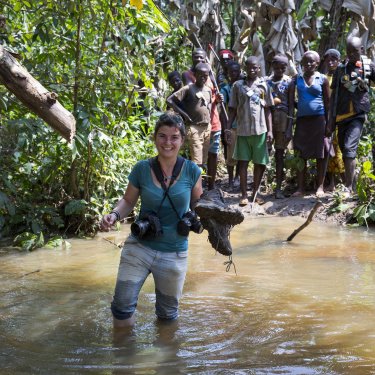Investigation stalled two years after French journalist’s death in CAR

On the second anniversary of French freelance photojournalist Camille Lepage’s fatal shooting in an ambush in the Central African Republic, Reporters Without Borders (RSF) and her mother, Maryvonne Lepage, call on the French authorities to assign the necessary resources to the French investigation into her death. The investigation, in which RSF has been registered as interested civil party from the outset, has ground to a halt despite repeated promises to clarify the circumstances of this young woman’s death.
On the second anniversary of French freelance photojournalist Camille Lepage’s fatal shooting in an ambush in the Central African Republic, Reporters Without Borders (RSF) and her mother, Maryvonne Lepage, call on the French authorities to assign the necessary resources to the French investigation into her death. The investigation, in which RSF has been registered as interested civil party from the outset, has ground to a halt despite repeated promises to clarify the circumstances of this young woman’s death. Lepage was killed near the western town of Bouar on 12 May 2014 while covering the Anti-Balaka militia. Her assailants have never been identified.
Lepage was killed near the western town of Bouar on 12 May 2014 while covering the Anti-Balaka militia. Her assailants have never been identified.
French President François Hollande, who is to visit the Central African Republic tomorrow, promised after her death that “all necessary resources will be allocated in order to shed light on the circumstances of this murder.”
RSF hopes that Hollande renews this undertaking as a result of the visit and that, this time, he ensures that the required resources really are allocated so that the promise is finally kept.
“We, Camille’s family, need to know who the assailants were,” Maryvonne Lepage said. “It is hard to live with the uncertainty. The investigation must be continued in the Central African Republic in order to clarify various questions that are still unresolved two years later.”
The investigation initiated in France immediately after Lepage’s death made little progress. A team of investigators conducted a visit in June 2014 but there was no follow-up visit.
In September 2014, the French judicial authorities submitted a formal request to the CAR prosecutor-general’s office for certain actions to be taken. But no action was taken. The CAR authorities say they lack the necessary resources, including a vehicle to visit the site of Lepage’s murder.
In June 2015, Maryvonne Lepage and RSF were received at France’s Crisis Centre, where they were given new commitments that the French embassy in the CAR would be informed of the importance of supporting the investigation. But since then, Maryvonne Lepage and RSF have not been notified of any progress.
Virginie Van-Geyte, a French investigating judge, is planning to send a group of specially appointed investigators to the CAR shortly to look into various cases including Lepage’s death.
“We welcome the fact that this team is being dispatched but we insist on the importance of its having the necessary authority and personnel to investigate effectively in the CAR,” RSF said. “The situation there is currently difficult and the investigation’s success will require special resources, without which it will get nowhere.”
The Lepage family and RSF have a number of recommendations which they hope to be able to share with Judge Van-Geyte in the very near future. They think it is important that a sufficient number of investigators be assigned specifically to the Lepage investigation, that they be authorized to travel outside Bangui, that they be allowed to visit the scene of the crime in Amada Gaza and that at least one of them should be a ballistics expert.
They would also like to submit a list of people who should be questioned because they could provide the investigators with useful information. These people were identified during the visit that Maryvonne Lepage made to the CAR last month.
Although young, Camille Lepage was a brave and dedicated photojournalist who did not hesitate to put her skills in the service of what she called “forgotten causes.” She covered the Egyptian revolution in 2011 and the birth of South Sudan before going to the CAR in 2013. Her unrivalled photos of the conflict in the CAR were widely used by the international media.
The Central African Republic is ranked 110th out of 180 countries in RSF’s 2016 World Press Freedom Index.


